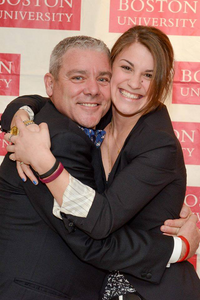NWHL’s Anya Packer Fights for Pay Equity
Banner photo by Samantha Gades on Unsplash

As a player for the Connecticut Whale women’s ice hockey team, Anya Packer (’12, CAS’14) learned firsthand the challenges of being a professional female athlete. Because players in the National Women’s Hockey League were paid so little, Packer had a day job in sales when she started playing professionally. She would work full days and spend her evenings at the gym and on the ice. On weekends, she would travel to games.
After three years of playing, Packer retired from hockey in 2018 and transitioned to a full-time role as executive director of the National Women’s Hockey League Players Association, where her experience as a player powered a fight for pay equity. During her time as director, she negotiated a 50/50 revenue split between the league and players, leading to a 30 percent increase in player salaries. In April, she was named general manager of the league’s Metropolitan Riveters of Monmouth Junction, N.J.
“I recognized that my contributions to the sport of women’s hockey were a lot greater if I was in the boardroom, if I was fighting for their rights, if I was doing all those things that netted out to success for these women, versus being on the ice,” Packer says.
Packer was recently featured on Forbes 30 Under 30 2021 list for her work advocating for players.
“I am most proud of empowering the women to fight for more and better,” Packer says. “I think the most important thing that I did successfully was get the female athletes comfortable with saying, ‘I don’t accept that.’ And that’s the only thing that’s going to drive a real change in women’s sports.”
Packer says the Forbes nomination is an affirmation of that achievement—and the contributions of others, including the league commissioner and players, who supported the push for a historic deal.

“It was not necessarily an indicator of my own personal success, but it was the success that we are all creating,” Packer says. “And so it felt like a very big moment, like a bigger than me moment.”
In her new role as the general manager of the Metropolitan Riveters—the NWHL team that her wife, Madison Packer, plays for—Packer has lofty goals, from increasing the profile of the NWHL to pushing hockey to be more diverse and inclusive. She also plans to continue fighting for equity in women’s sports.
“I think there’s a lot of things that female athletes need and it’s truly representation, it’s giving women more representation, more growth possibilities.” Packer says.
Before turning professional, Packer played hockey at BU for two seasons. According to Cheryl Boots, a senior lecturer in humanities, Packer was an engaged student—and already a natural leader.
“I could see that her peers, and especially her fellow athletes, saw her as a leader even in her first year at BU,” Boots says. “By watching her and other women hockey players on the ice, I gained a true appreciation for her sport—especially the skill and endurance necessary to be successful on the ice.”
Packer credits her time at BU and CGS with broadening her worldview and helping her “figure out where I belonged and what I wanted.”
